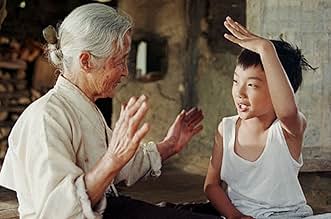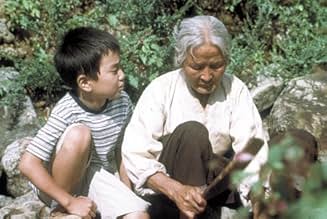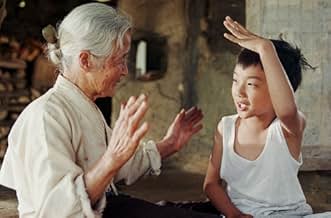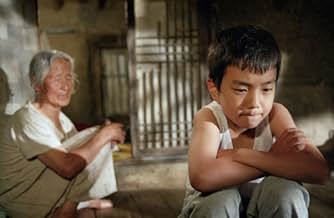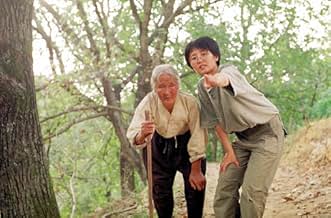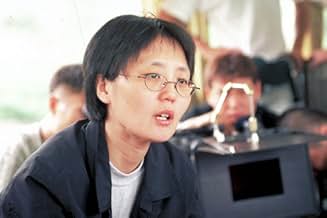IMDb RATING
7.7/10
6.2K
YOUR RATING
This is the story of a 7-year-old boy, Sang-woo, born and raised in the big city, and his mute grandmother, who has spent her whole life in a small rural village.This is the story of a 7-year-old boy, Sang-woo, born and raised in the big city, and his mute grandmother, who has spent her whole life in a small rural village.This is the story of a 7-year-old boy, Sang-woo, born and raised in the big city, and his mute grandmother, who has spent her whole life in a small rural village.
- Awards
- 12 wins & 11 nominations total
- Director
- Writer
- All cast & crew
- Production, box office & more at IMDbPro
Featured reviews
I saw this movie a few weeks ago in my korean school, and thought it was pretty good. I had just recently found out that it was out in theatures. The grandma is a simple, loving mute and deaf grandmother, forced to take care of her daughter's whiny son. The boy does everything to annoy his grandmother, making me (and others, i bet) to smack that annoying brat upside the head and give him a good kick. Overall, it is an okay movie, but nothing i'll remember all my life. 7/10
I've not seen anyone depict better the bittersweet relationship between a spoiled child and his patient grandmother than Korean director Lee Jeong-Hyang's ` The Way Home.' Nothing spectacular happens during seven-year-old Sang-woo's visit to grandmother's home in a rural village after his single mother drops him off. Changes occur, albeit predictably; the glory is in the small matters that will matter much to the boy as he matures long after the visit.
Why won't this film make it big if I like it so much? Well, the kid kills no one, smokes nothing, and speaks in child language, so audiences might just yawn. Additionally, the boy is a poor actor who hasn't been directed well. But grandma, now there is an actress. Kim Eul-boon was discovered in her native village, 78 years old and never seen a movie! Hunched over, skin leathery and crinkled, expressions minimalist, she embodies the infirmities of old age and the resolution of a tough spirit to care for herself and other ancient neighbors to the last breath. Her grandson, abusive and self-centered, is just another person to care for who she knows is worth saving, in unconditional love probably unacceptable to aggressive Americans.
When grandson plays with neighbor kids, he learns about the life's dangers by experiencing the menacing bull regularly chasing them down a particular stretch of necessary road. When he longs for the companionship of a neighbor girl, he learns you have to work at love. When he looks for grandma's love, he finds it in her smallest gestures, like buying and cooking him a chicken she thinks he wants when all he really wants is KFC.
And so this country life goes on with the boy erratically moving from resentment to love and back again in an endlessly ambivalent cycle. The batteries he uses up for his electronic games serve as metaphor for his city life's wasteful and empty energy.
The semi-modern buses coming to and from the market also serve as emblems of the tenuous relationship between city and province, grandmother and daughter, grandmother and grandson. So real is the slow and unglamorous rural life that you know Hyang has understood accurately that life and love are served slowly through its minor moments.
I guarantee you will never forget the charismatic grandmother outfitted as a lowly peasant-she is a survivor and one hell of an actress. The film is dedicated to all grandmothers. `Here's looking at you, Kid.'
Why won't this film make it big if I like it so much? Well, the kid kills no one, smokes nothing, and speaks in child language, so audiences might just yawn. Additionally, the boy is a poor actor who hasn't been directed well. But grandma, now there is an actress. Kim Eul-boon was discovered in her native village, 78 years old and never seen a movie! Hunched over, skin leathery and crinkled, expressions minimalist, she embodies the infirmities of old age and the resolution of a tough spirit to care for herself and other ancient neighbors to the last breath. Her grandson, abusive and self-centered, is just another person to care for who she knows is worth saving, in unconditional love probably unacceptable to aggressive Americans.
When grandson plays with neighbor kids, he learns about the life's dangers by experiencing the menacing bull regularly chasing them down a particular stretch of necessary road. When he longs for the companionship of a neighbor girl, he learns you have to work at love. When he looks for grandma's love, he finds it in her smallest gestures, like buying and cooking him a chicken she thinks he wants when all he really wants is KFC.
And so this country life goes on with the boy erratically moving from resentment to love and back again in an endlessly ambivalent cycle. The batteries he uses up for his electronic games serve as metaphor for his city life's wasteful and empty energy.
The semi-modern buses coming to and from the market also serve as emblems of the tenuous relationship between city and province, grandmother and daughter, grandmother and grandson. So real is the slow and unglamorous rural life that you know Hyang has understood accurately that life and love are served slowly through its minor moments.
I guarantee you will never forget the charismatic grandmother outfitted as a lowly peasant-she is a survivor and one hell of an actress. The film is dedicated to all grandmothers. `Here's looking at you, Kid.'
You should not always judge a movie by its covers! "Jibeuro" or "The Way Home" is an amazingly beautiful movie. The story is heartfelt and warm, touching and to the point.
The characters in the movie, despite being limited to a few central characters, are very well portrayed and the actors/actresses really bring their roles to life on the screen.
If the story of this movie does not move you or touches you, then you are without a heart. It is one of the more beautiful movies that I have watched. "The Way Home" tells a touching story of differences between youth and elderly, the importance of values in life, and it does so with compelling sincerity that will leave you in tears. Throughout the movie I grew angry at the child, at how he could treat his loving grandmother that way, and my heart went out for the grandmother and her endless love and acceptance. This movie is one of a kind!
I was told to watch this movie, and were somewhat reluctant, given the cover of the movie and what it read on the back cover. But I sat down and saw it, and I was moved. This is definitely a heartfelt movie that will stay with you for a long, long time.
The characters in the movie, despite being limited to a few central characters, are very well portrayed and the actors/actresses really bring their roles to life on the screen.
If the story of this movie does not move you or touches you, then you are without a heart. It is one of the more beautiful movies that I have watched. "The Way Home" tells a touching story of differences between youth and elderly, the importance of values in life, and it does so with compelling sincerity that will leave you in tears. Throughout the movie I grew angry at the child, at how he could treat his loving grandmother that way, and my heart went out for the grandmother and her endless love and acceptance. This movie is one of a kind!
I was told to watch this movie, and were somewhat reluctant, given the cover of the movie and what it read on the back cover. But I sat down and saw it, and I was moved. This is definitely a heartfelt movie that will stay with you for a long, long time.
10Jamester
This is a most touching and honest love story. 'Love story', you may wonder?? Are we talking about the same movie? Indeed, the Way Home is a story about a grandson and grandmother with love in the agape tone as it's central theme. Perhaps it's because of the distance between the two: the urban vs the rural; the materialism versus the simple living; or the selfish versus the selfless -- the contrasting styles really make for an interesting comparison in views of the world.
There really was a huge chasm that had to be overcome at the start of this movie, and the action moved superbly in filling out the moments and telling a very visual story of crossing the chasm.
When I read that the director could have spent 2 months filming this movie by shooting in the most efficient manner possible (i.e. common location scenes shot all at once), but chose not to, I was floored. The director *chose* to shoot this movie in chronological sequence spending 6 months on it in order to ensure the emotional sequence would be intact and exact. What a *great* choice -- and it really showed through the movie making it absolutely AMAZING.
This is a very moving movie. I recommend it without reservation.
There really was a huge chasm that had to be overcome at the start of this movie, and the action moved superbly in filling out the moments and telling a very visual story of crossing the chasm.
When I read that the director could have spent 2 months filming this movie by shooting in the most efficient manner possible (i.e. common location scenes shot all at once), but chose not to, I was floored. The director *chose* to shoot this movie in chronological sequence spending 6 months on it in order to ensure the emotional sequence would be intact and exact. What a *great* choice -- and it really showed through the movie making it absolutely AMAZING.
This is a very moving movie. I recommend it without reservation.
10shneur
The key to this movie is the contrast between the traditional "Eastern" values of Harmony and Inner Focus, and the intruding "Western" ones of Mastery and Acquisition. The seven-year-old protagonist brings with him the culture of the big city, Seoul in this case, but it could be anywhere, represented by his battery-operated game and the fact of his mother dumping him in the first place. He is confronted with his elderly grandmother, who simply refuses to engage him in the kind of outer battle he expects, neither to win it nor to lose it. We as audience continually visualize a "modern" parent either bullying this child into submission, or alternatively pandering to his oblivious self-centeredness. Instead, this caretaker evinces UNRELENTING respect for him as a human being: she never once blames, insults, or degrades him. Thus she sets him on the path of an inner journey which are left hoping will last a lifetime.
Did you know
- TriviaAt the time of casting, Kim Eul-boon (Grandmother) had not only never acted before, but never even seen a film before.
- Crazy creditsBefore end credits: "Dedicated to all grandmothers"
- ConnectionsReferenced in Film Geek (2005)
- How long is The Way Home?Powered by Alexa
Details
- Release date
- Country of origin
- Official site
- Language
- Also known as
- Шлях додому
- Filming locations
- Production companies
- See more company credits at IMDbPro
Box office
- Budget
- $2,000,000 (estimated)
- Gross US & Canada
- $445,367
- Opening weekend US & Canada
- $29,737
- Nov 17, 2002
- Gross worldwide
- $24,952,738
- Runtime
- 1h 20m(80 min)
- Color
- Sound mix
- Aspect ratio
- 1.85 : 1
Contribute to this page
Suggest an edit or add missing content



